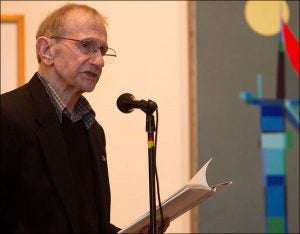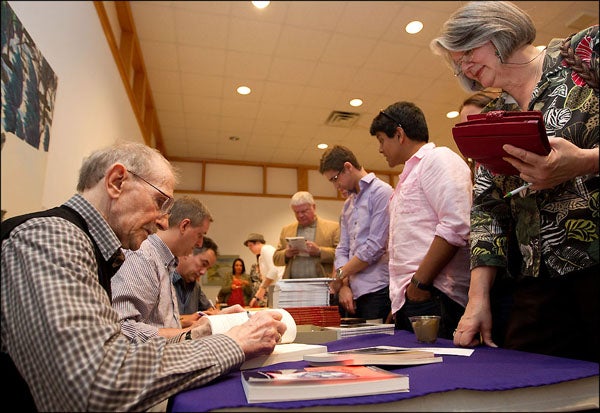POWER OF LANGUAGE
U.S. Poet Laureate shares poetry, anecdotes
A visit from the U.S. Poet Laureate drew a standing-room-only crowd of more than 200 literature lovers to the Greenville Museum of Art on April 25.
Born and raised in Detroit, Phillip Levine is known as “the working man’s poet.” The author of more than 20 books of poetry, essays, and translations, Levine won the National Book Award in 1991 for his collection, “What Work Is,” and the Pulitzer Prize in 1995 for “The Simple Truth.” He has also received numerous other awards, including the first American Book Award for Poetry and, on two occasions, the National Critics Circle Book Award. His most recent collection, “News of the World,” was published in 2010.
Levine’s visit was the third installment of the Contemporary Writers Series. Sponsored by the ECU Division of Research and Graduate Studies and the Department of English, the series aims to expose students and other readers to award-winning fiction and nonfiction writers, translators and poets.
“We want to bring the best of American and International writing to ECU and the community so that we can fully know the world we belong to and our role in it,” said Tom Douglass, a literature professor in ECU’s Department of English and one of the organizers of the Contemporary Writers Series.
In the two hours Levine spent with ECU faculty, students and community members, he didn’t discuss either his honorary position or writing process. He simply entertained the audience with poem after poem, broken up by funny anecdotes.
“I try to find a poem and half the reading passes with me thumbing through,” Levine said, searching for a particular piece to read among several books on his lectern. “And then I find it but I don’t like it.
“I once searched and searched for a poem and – this is true – I hadn’t written it. I’d never finished it.”
He did offer advice to those teaching writing, framed by the title of one of his poems: “He Would Never Use One Word When None Would Do.”
“It’s a wonderful motto to pass to your students who’re writing poetry,” he quipped.
Levine also offered explanations of the real people, places and other references occupying his poems. ECU senior Kamal Darji said he appreciated the style of Levine’s presentation.
“I usually get bored reading poetry,” Darji said. “But in his voice, it was different.”
The psychology major said it was the first poetry reading he’d ever attended, but he came because he’s taking an English class with associate professor Liza Wieland – one of the people responsible for bringing Levine to Greenville. She taught alongside the poet laureate at California State University in Fresno.
“I hope (the students) take away some sense of the power of language and know that poets walk the earth,” Wieland said. “They’re not all dead guys.”
Many of Wieland’s students were in the audience, and though they don’t study poetry in her fiction writing classes, she stressed that all writing is poetry.
“It’s putting beautiful words together.”
Bethany Bradshaw is pursuing a master’s in English at N.C. State University. She learned Levine would be speaking in Greenville and came to hear the man whose words she’d read in poetry classes.
Bradshaw said the accessibility of Levine’s poems and “degree of humanity” are why people appreciate his work.
“It speaks to everyone’s everyday,” she continued. “It’s very relatable but gets to…the depth of being.”
“It was worth the drive, for sure.”
For more about the Levine and the history of U.S. poet laureates, visit http://www.loc.gov/poetry/laureate.html.

U.S. Poet Laureate Phillip Levine reads his work to an overflow crowd at the Greenville Museum of Art.
